'Scindia's willingness to consort with the BJP, a party he has rightly, and eloquently, excoriated in various speeches and statements in the recent past, suggest a shallowness and hollowness of convictions and principles.'
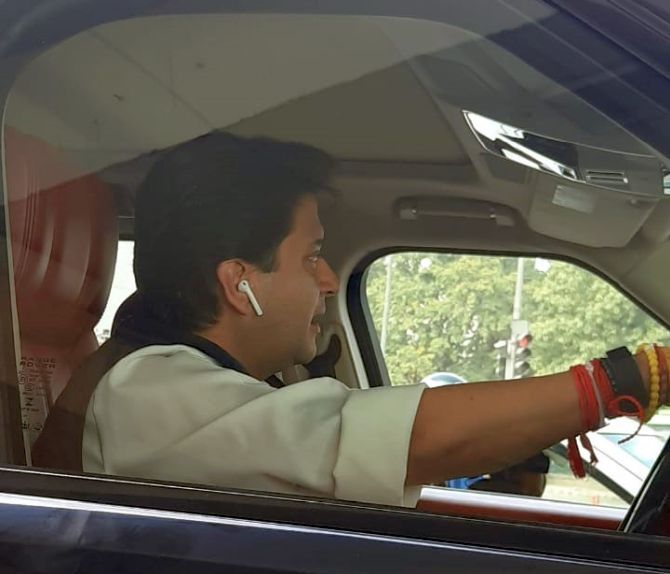
After losing its deposit in 63 out of 70 seats in the Delhi assembly election on February 11 and Jyotiraditya Scindia's departure from the party on March 10, where does the Congress stand?
One Congress leader who raised his voice for the urgent need to have a strong leadership in the party is Thiruvananthapuram's member of Parliament, Shashi Tharoor.
"We need to start with a longer-term, as opposed to an interim, Congress president," Dr Tharoor tells Rediff.com's Shobha Warrier.
What kind of impact will Jyotiraditya Scindia quitting the Congress have on the party? Are young leaders unhappy with the way the party is functioning?
Scindia's departure has much to do with reasons that are personal to himself and do not extend to others.
Yes, his own followers, mainly in one region of Madhya Pradesh, have exited with him. But that will be the extent of it.
His willingness to consort with the BJP, a party he has rightly, and eloquently, excoriated in various speeches and statements in the recent past, suggest a shallowness and hollowness of convictions and principles that few others would be willing to emulate.
Other young leaders may have issues, but they seek to resolve them within the party whose principles they believe in.
As a Congress leader, how shocked were you when your party lost its deposit in 63 seats in the Delhi assembly election?
It was naturally dismaying to see the results from the Delhi election, primarily because they came in at a time when we should have been consolidating our position as the obvious answer to the increasingly discredited Bharatiya Janata Party.
Instead, as the sobering reality of the results made clear, we were left to deal with the fallout of a campaign that secured less than 4% of the vote share and the spiralling downwards of our fortunes in a state which was once considered to be the stronghold of the party, a state where we had a proven record of credible and widespread development under the able leadership of the late Sheila Dikshit.
Even after the humiliating defeat, only her son Sandeep Dikshit questioned the leadership issue, followed by you. Was the silence that followed, and the lack of more support from other Congress leaders, on expected lines?
I am not sure the 'silence' has been universal. Others such as Manish Tiwari, Mani Shankar Aiyar and a couple of others have also spoken out. Those who are actually in the Congress Working Committee or hold senior office-bearer positions are understandably constrained in what they can say publicly.
Why is it that many Congress leaders who whisper about the need to have a proper election for the party president, are scared to air their opinion loudly?
I cannot speak on behalf of other leaders. But on my part, as you know, I have made my own views on this matter very clear and I have done so out of the greatest loyalty to the ideals and values of the Congress party.
I am not a lifetime politician; I do not think like a careerist, anxious above all to avoid rocking the boat.
I am in politics because I hold a set of convictions I believe are necessary for India to advance, and I support the Congress because its history, its experience, and the talent available to it make it the best vehicle to advance the inclusive values and pluralist principles I hold dear.
We need the best Congress party vehicle we can put on the road, and I believe elections are a good way of getting the right person into the driver's seat.
'I wish Rahul hadn't resigned and was one of those who tried to talk him out of it.'
'But if he is determined that someone else should take on the job, we should not delay in finding a process to identify that someone.'
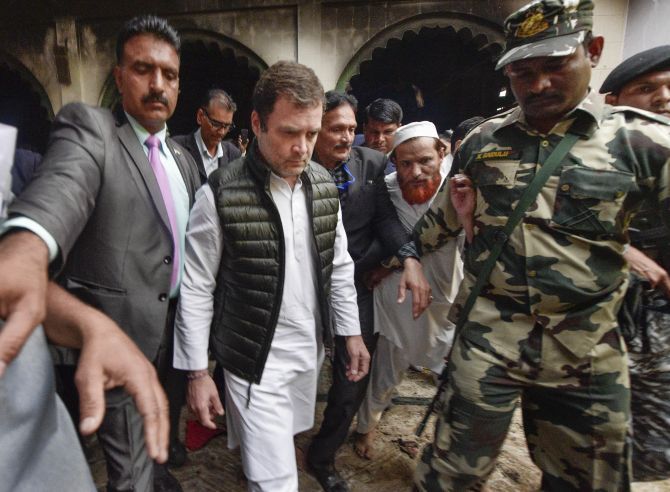
Will the Congress have an election for the post of party president?
I don't know, since I am not a member of the CWC which makes these decisions and don't know what it has discussed.
But aside from an election for president, I believe there should be one for the CWC.
There are three categories of members in the CWC -- elected members, permanent invitees, and special invitees. All three are currently named by the high command, but I believe it would be healthy for the party if the 'elected members' were actually elected.
If the elections produce a lopsided result -- for example, if not enough women, or Southerners, or minorities, or SC/STs are elected -- the high command can redress the balance by including these under-represented categories among the invitees.
As a student of history, I recall with great appreciation the way in which CWC elections used to enliven the party in the old days.
There may be differing opinions on whether or not the party's decision-making body should be opened up for elections. Some do feel the president should have like-minded people around him or her in the CWC.
As a democrat, I believe the value of a truly representative body within the party is immeasurable.
To begin with, the election process itself would energise the workers and give them a sense that they are in control of their party's political destiny.
And I do hope that those who are currently against the idea recognise that a participatory electoral process that ushers in and channels the wishes of the members of the AICC plus PCC delegates -- some 10,000 workers in all -- is an exercise in inner-party democracy that will strengthen the party.
It will usher in a dynamic leadership team with a credible mandate to work together to address the organisational challenges within the party.
It could also have other beneficial effects -- for instance, it could increase the national interest in the party.
We saw the global interest in the British Conservative party during their recent leadership race. In fact, the mere process of several rounds of voting that eliminated some contenders and finally narrowed down the list to two, from which Boris Johnson was elected, enthralled the public and drove the party up in the polls.
Replicating a similar scenario for the Congress will similarly galvanise more voters towards the party once again.
And ultimately, we need to recognise that the party needs to evolve with the times and a process of revival also means a process of bringing in new ideas and fresh faces that can offer solutions to present day challenges.
Why is it that your party still cannot think beyond the Nehru family?
I don't think that is a fair assessment.
Obviously, the Nehru-Gandhi family holds a special place in the hearts of Congress party members -- and with good reason too. Aside from the great legacy they have inherited from their illustrious forebears, they have consistently brought together the various groups, ideologies, geographies and communities that collectively make up the fabric of the Congress party and have a clear record of success and experience in leading the party, both when in government and during tough times in the wilderness, when they have still managed to rally the men and women of the Congress together.
Let us not forget the magnitude of what they have achieved for the party -- or the ultimate sacrifice paid by two former presidents from the family.
At the same time, through their leadership, the party, over successive generations, has also managed to cultivate a strong crop of dynamic leaders both at the Centre and in the states.
These are men and women who have and continue to offer strong leadership and have in their own way worked tirelessly and effectively to take the party forward.
The Congress looks like a rudderless ship now.
That is not fair, since Shrimati Sonia Gandhi is an experienced and capable president who is very much in charge.
But because she had relinquished the post just two years ago, and was named as an interim president, with no clear deadline for a more lasting solution, I do think there appears to be a growing perception in the eyes of the public that we, as a political entity, are adrift -- and this is naturally driving some voters towards considering other political options.
The most recent example of this can be seen in Delhi where the voters chose to side (primarily) with the Aam Aadmi party and (to a smaller extent) with the BJP, leaving us with naught.
This is where the compelling case for urgently addressing this perception in the eyes of the public comes from and, for that matter, changing the attitudes of the media, which is repeatedly writing us off dismissively (as your own question implies).
But for us to do so, we do need to fix our current leadership issues. We need to start with a longer-term, as opposed to interim, Congress president, as well as the 'elected' membership of the working committee.
I have personally been an outspoken advocate for free and transparent elections within the party for these positions -- because such a process would significantly add to their credibility and legitimacy which, in turn, would be vital assets as they set about the significant organisational challenges associated with re-energising the rank and file of the party.
Would you agree if I were to say that the 'slow death' of the grand old party is because it still clings to a dynasty, and people of India have had enough of dynastic politics?
I still do firmly believe that obituaries for the Congress party remain premature. Let us not forget that we have managed to form successful alliances in both Maharashtra and Jharkhand and offered a strong challenge to the BJP in Haryana.
We have effective governments in Puducherry, Madhya Pradesh, Rajasthan, Punjab and Chhattisgarh, all of which have a proven record of credible performance.
In the previous Lok Sabha election, we secured 19 per cent of the vote share, which is no small number.
But there are clearly challenges that we are facing at the moment and strong questions that we need to find comprehensive answers for so rather than dwell on these positives, we need to use these aspects to build a certain momentum that can usher in the much needed process of revival within the party.
Do you think the party was drubbed in the general election because of the language Rahul Gandhi used against Narendra (Damodardas) Modi?
I think our setback in the national election is a collective failure and shouldn't be saddled on the shoulders of Rahul Gandhi alone.
In his case, not only did he wage an animated and tireless campaign against the BJP and its failures, but worked overtime to unite and rally Congressmen and women across the country. And yet, despite this, when the results came in, he offered his resignation to take public accountability for our collective shortcomings.
Even to date, the rank and file of the Congress still look up to Rahul Gandhi for the magnitude of his contributions, and are pretty unanimous in their belief that he has the capacity and vision to rally the party together and take it forward.
This is why most of us were keen for him to continue and stay on in this role after the elections, because while we respected his desire to publicly offer accountability for our defeat, we still felt there is no one better to ensure the much needed process of revival that is needed for the party.
I wish he hadn't resigned and was one of those who tried to talk him out of it. But if he is determined that someone else should take on the job, we should not delay in finding a process to identify that someone.
How dangerous is it for a country not to have a strong Opposition?
Very. For India, a strong and effective Congress-led Opposition is indispensable.
An energetic and dynamic Opposition that is capable of holding the government of the day accountable for its actions, and at the same time is in a position to contribute in terms of ideas and deliberations on matters of national policy-making, is an indispensable fulcrum of any democratic society.
In India, given what we are going through with a fundamental challenge to the very foundations of the Republic, arguably the case for a strong opposition is even more acute.
The Congress is the only party with the experience, credibility and nationwide footprint to challenge and counter the divisive rule of the present government.
We must resist the BJP's incessant attempts to undermine the democratic, pluralistic and inclusive heritage that our forefathers gave their lives for.
A strong Congress is what the nation needs -- it is not just Congressmen who are demanding it.
Finally, how it feels to be 64 (Dr Tharoor turned 64 on Monday, March 9) in the words of the Beatles?
The Beatles asked, 'Will you still love me, will you still need me, when I'm 64?.' I am gratified to discover that so many compatriots from the around the country have used the occasion of my birthday to convey their love and regard for me, that my constituents assure me they still need me -- and I have no doubt the nation needs an effective Opposition, of which I am proud to be a part.
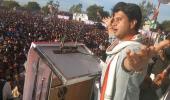

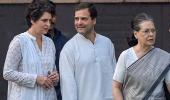

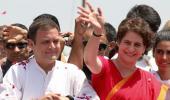






 © 2025
© 2025